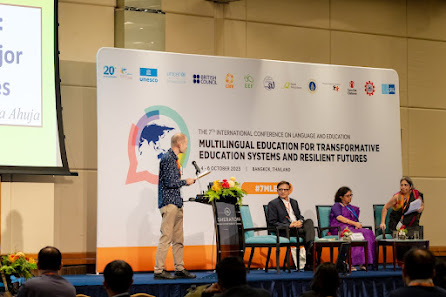7th MLE Conference and its relevance for India
It was quite energising to participate last week in the Asia-Pacific MLE conference in Bangkok. Having so many educationalists come together to learn about how multilingual education is implemented in different settings was inspiring. There were several presenters from India, but the presentations from other countries were also quite relevant for the Indian context.
The 7th International Conference on Language and Education was hosted by UNESCO in Bangkok from 4 to 6 October, 2023. The conference had 475 participants from civil society, academic institutions, and governments. High-level policymakers from over twenty governments in Asia and the Pacific also attended. The Indian government was represented by Ms. Archana Sharma Awasthi, Joint Secretary in the Department of School Education and Literacy, MHRD.
India was quite prominently represented at the conference. Prof. Tsimpli Ianthi shared on the first day about her research on the value of using multiple languages and experiments in Andhra Pradesh (Multilingual Education for Inclusion and Resilience: Teaching, Learning, and Assessment Pathways). Dr Pooja Nakamura talked about the two pillars needed for reading (Decoding and Comprehension) with a lot of examples from India (Words Fail Learners Again and Again: Unpacking the Evidence Base for Language of Instruction Transition Policies and Practices in Low- and Middle-Income Countries). On the third day, there was an India-focussed panel discussion on “Language Mapping in India: An Instrument for Adopting Multilingual Education Strategies'' with Archana Sharma Awasthi (MHRD), Dhir Jingran (LLF), and Sunisha Ahuja (UNICEF) moderated by Karsten van Riezen (SIL Intl). As educational language mapping is relatively a new phenomenon, this attracted quite some attention.
There was frequent mention of the poverty in worldwide education caused in part by the COVID pandemic. It was sobering to hear from Jeffrey Sachs that there is relatively little money available to address this crisis (Financing to Achieve SDG 4, Quality Education for All, Including Local-Language Instruction). The good news was that Cristian Aedo of the World Bank presented that the latest World Bank policies are very favourable for multilingual education (Effective Language of Instruction Policies for Foundational Learning).
The conference resulted in the endorsement of the ‘‘2019 Bangkok Statement on Language and Inclusion,’ which calls for action by governments and stakeholders in education to promote the ‘first language-based multilingual education policies and programmes’. It also calls to promote learning, strengthen education systems, and look into the crisis faced in learning by using the mother tongues in the classrooms.
Below is an overview of all the abstracts of the presentations related to India. For an overview of the conference, you can watch the video news report by the NBT (National News Bureau of Thailand) or read this report on the UNESCO official website. We had also posted about this conference on our blog in February this year (MLE Blogspot). I am already looking forward to the next MLE conference probably three years from now!
Regards,
Karsten
Resources:
UNESCO Item on the conference outcomes: High-Level Policy Forum on Multilingual Education endorses ‘Bangkok Priorities for Action’ | UNESCO
News report by NBT News about the 7th MLE Conference: https://www.facebook.com/nbtworld/videos/1381835792745923/?extid=CL-UNK-UNK-UNK-IOS_GK0T-GK1C
Blog Post on the conference: http://www.mle-india.net/2023/02/7th-international-conference-on.html
Photo Credit: Felise Alaichamy, SIL International.
Abstracts/panels related to India from the 7th MLE Conference:
Programme Schedule (abstracts/panels): https://asiapacificmle.net/conference/2023/programe
Dr Pooja Nakamura –Words Fail Learners Again and Again: Unpacking the Evidence Base for Language of Instruction Transition Policies and Practices in Low- and Middle-Income Countries)
Anil Kumar Kursenge (Indira Gandhi National Centre for the Arts New Delhi) –The Relevance in Contemporary Times of Traditional Wisdom Regarding Biodiversity with Special Reference to Language Groups in Andhra Pradesh, India
Nivrita Durgvanshi (Room to Read): From Clicks to Comprehension: Navigating Digital Landscape to Enhance Teachers’ Capacities in Foundational Literacy in Multilingual Classrooms in India
Nancy Horo (LEAD India) – Outcomes of the Amri Karbi Language Development and Education Project in Northeast India
Pallavi (Azim Premji University, Bangalore), Rama Mathew (Department of Education, University of Delhi (Retired) – Multilingual Assessment for Multilingual Education in India: An Imperative or an Option?
(David Bradley (La Trobe University) – Literacy and Language Maintenance in China, Myanmar, Thailand and India: The Case of LI-SU (Lisu)
Raaj Arundhati (Fidel Softech) – Multilingual Education and Indigenous Learners in Kerala, India: A Case of Leaving Behind or Leaving Outside?
Kartik Barad (Jawaharlal Nehru University) – Translanguaging Pedagogical Strategies and the Capacity to Voice and Learn in Multilingual Schools in Odisha, India
